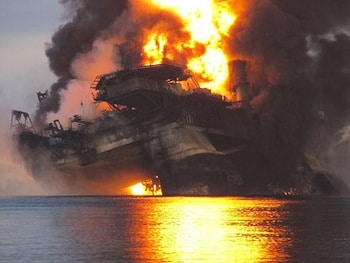Offshore oil drilling giant Transocean released the results of an internal investigation this week on the causes of last year’s Deepwater Horizon oil rig explosion. The investigation concluded that well owner BP was to blame for the explosion and the resulting 3-month oil geyser in the Gulf of Mexico.
Transocean claims that BP’s actions led to the blowout, as they were in charge of most of the decision-making on the Deepwater Horizon rig. Transocean says that BP’s poor decisions caused a succession of problems ranging from the well design itself to the construction process of the Macondo rig. Transocean officials also fault BP for causing a breakdown in communication during construction, which they claim led to many of the failures aboard the oil rig. Here are a few highlights from their report:
BP did not properly communicate to the drill crew the lack of testing on the cement or the uncertainty surrounding critical tests and procedures used to confirm the integrity of the barriers intended to inhibit the flow of hydrocarbons from the well. A hydrocarbon is a compound consisting of hydrogen and carbon that is found in oil and gas.
BP adopted a technically complex nitrogen foam cement program for sealing the well. The resulting cementing job was of minimal quantity, left little margin for error, and was not tested adequately before or after the cementing operation. Further, the integrity of the cement may have been compromised by contamination, instability, and an inadequate number of devices used to center the casing in the wellbore.
Cement contractor Halliburton and BP did not adequately test the cement slurry used to seal the well.
BP also failed to assess the risk of the temporary abandonment procedure used at Macondo. At the time of the explosion, BP was making sure the well was sealed so it could temporarily abandon the site and perhaps come back at some point in the future to produce oil from the exploratory well. Transocean said BP generated at least five different temporary abandonment plans for the Macondo well between April 12, 2010, and April 20, 2010. After this series of last-minute alterations, BP proceeded with a temporary abandonment plan that created risk and did not have the required government approval.
Transocean’s report also claims that their blowout preventer (BOP) was fully operational and played no part in the explosion and oil leak. Transocean was the owner of the blowout preventer, a device that had the potential to prevent the massive oil leak into the Gulf of Mexico. Their claim that the BOP was working properly goes against the findings of previous reports.
As we’ve reported in the past, numerous failures led to last year’s disaster in the Gulf of Mexico, including a lack of regular inspections and a cozy relationship between rig owners and federal regulators.
Transocean is facing numerous lawsuits for their role in the Deepwater Horizon explosion, and their report is likely an attempt to shift the blame onto BP and Halliburton. The likelihood of their internal investigation playing a significant role in litigation remains small, as the government’s report has clearly stated that all parties share in the responsibility for the catastrophe.
Subscribe to our newsletter
Stay up to date with DeSmog news and alerts







